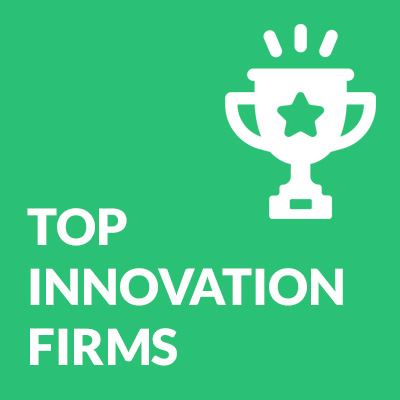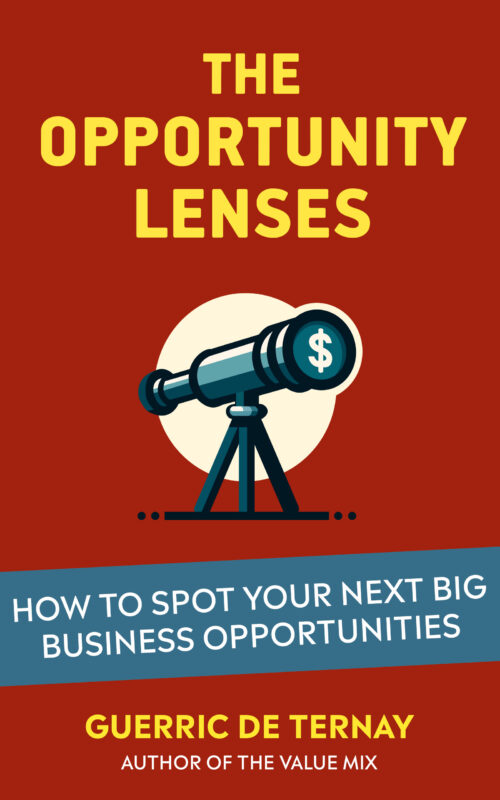 What are some of the top innovation consulting firms you could join?
What are some of the top innovation consulting firms you could join?
In this article, I want to do two things:
- To explain the different types of innovation consultancies,
- To share with you a selection of some of the best innovation consulting firms.
Let’s dive in!
What’s an innovation consulting firm
An innovation consultancy is a firm that helps companies prepare themselves for the future.
How does this work?
Innovation firms partner with their clients to solve the challenges that are going in the way of exploring new sources of growth.

They provide support through different type activities, including:
- Spotting new opportunities
- Facilitating innovation workshops (more about this here)
- Creating an innovation portfolio
- Developing a strategic narrative
- Testing new ideas
- Providing innovation training
- Piloting a new business model
When I talk about this, people are often surprised that companies do not do that themselves. But, when you’re in the driving seat, it’s extremely difficult to plan your journey at the same time.
It’s the same for companies. It’s hard to execute a plan, while figuring out what you should do next.
Where innovation consulting firms come from
In the early 20th century, companies started growing at scale. They needed support to optimise their operations. This led to the birth of management consulting.
Innovation consulting firms were born out of another problem in the 1990s and 2000s. The changing business environment requires companies to reinvent themselves. It’s not just about being better at what you already do, it’s also about figuring out what else you can do to grow and remain relevant in a rapidly changing space.

Let me explain by comparing management consulting and innovation consulting:
- Management consulting is about helping companies better operate and manage themselves. It’s about processes, efficiency, resource allocation, cost management, etc.
- Innovation consulting is about helping explore new products and business models. It’s about discovering and testing new ways to generate revenue.
While management consulting focuses on improving upon the existing, innovation consulting is focused on figuring out what comes next.
Read more: If you want a more in-depth explanation, have a read of my detailed definition of what’s innovation consulting.
Different types of innovation consultancies
As you might expect, not all the firms are the same. To help you better understand the landscape, I divide the innovation firms in three buckets:
- Independent consultancies
- Departments of large consultancies
- Acquired consultancies
For each category, I’ll share the specificity of working for such a firm.
Independent innovation consultancies
Independent innovation consultancies are private companies that deliver their services under one brand.
You can notice differences between:
- Larger consultancies, which tend to reach a critical mass of a few hundreds consultants
- Newer consultancies, which look more like startups with a handful of employees
I make the distinction because working for one type or the other feels very different. I’ll explain.
Larger innovation consultancies
In the “older” category, I put innovation consultancies that have existed for 5 to 30 years.

They tend to be led by their founders, but those may have been replaced by a non-founding executive team. This can have an impact on the culture and how the company runs. A founder-led consultancy tends to rely more on their ideas and vision. When the founders aren’t in the leadership team, ideas and the vision can be a bit more decentralised. Note that every consultancy will have a different governance system.
One noticeable difference: An older agency will have recurring clients and more inbound sales, as it can rely on its creds and reputation.
That being said, the size of the deals can be limited compared to consultancies that are part of public companies. To differentiate themselves, they may also focus on a smaller number of industries or types of services they provide.
Newer innovation consultancies
Newer consultancies will be led by their founders with very little hierarchy. For junior consultants, it will be easier to get more exposure and responsibilities.

What’s appealing is that it’s likely you’ll be working on new ways of approaching innovation. When you start a consultancy, you need to differentiate yourself. This will mean showing to your clients that you provide innovation services that do not exist, e.g., a new methodology, new ways of working, and new tools to use.
You also tend to have more freedom to create and take initiatives.
One thing to note with newer firms: There is a massive focus on sales and building credibility. This is especially important for senior consultants, who will spend lots of time pitching and responding to RFPs.
Departments of large consulting groups
Looking at the success of independent firms, large consulting groups also started delivering innovation services by setting up their own departments.

There, you will tend to have less freedom than in independent consultancies because you’ll have to follow the “mothership”. It means more admin, strict staffing and promotion policies, and less flexibility regarding how you spend your time. It comes with advantages and disadvantages.
- One thing that’s quite appealing is that you’ll benefit from some momentum when selling work, as you’ll be selling new services to existing clients.
- One of the risks is that the innovation department is in the service of selling other kinds of work. Some departments end up just running workshops rather than inventing new products and delivering strategic recommendations.
Talking about workshops: If you want to know more on how workshops are run, have a read of my guide on how to run great workshops.
Acquired innovation consultancies
An alternative for setting up an innovation department is to acquire an independent agency. Over the last few years, there’s been a big wave of consolidation with many independent firms being acquired by large consulting groups.
Here, it feels like a blend of the previous types. But note that it can evolve quickly. You may have a lot of freedom at the start and rapidly have to adopt more and more set processes. This depends on the type of integration strategy.

When speaking with people who work for companies that have been acquired, I noticed two types of acquisition strategies: Swallowing and scaling.
- Swallowing means that the company lost its brand name and merged with another acquisition or an existing innovation department,
- Scaling means that the acquirer sees potential in the brand and invests to open new offices and recruit more consultants.
While the former scenario can be deceptive, the latter one is exciting as it opens many opportunities for growth.
If you’re looking to join an innovation consultancy, spotting a recent acquisition that is scaling can be a great idea, as they will have more job openings.
Getting a job in innovation: If you’re interested in the innovation space, read my advice on how to get a job in innovation consulting.
Comparing different types of firms
To sum up the points I made before, let me share with you a table that compares the different kinds of innovation consulting firms.
| Larger independent innovation firms | Newer independent innovation firms | Departments of large groups | Acquired innovation consultancies | |
|---|---|---|---|---|
| Advantages | - Often strong reputation - Existing portfolio of clients - Security while having a family feel - Potential international exposure | - Lots of responsibilities even for junior consultants - Ability to shape the offering - Close family feel - High exposure to clients - Potential rapid growth | - Startup feel with more security - Ability to leverage existing client relationships - Synergy with other services - Access to wide network International exposure | - Rapid growth - Opportunities for career development - International exposure - Wider network of experts - Ability to leverage existing client relationships |
| Watch-outs | - Could be political - Narrow set of offers - Slow growth | - Heavy on sales - Could feel chaotic - High entrepreneurial risk - Mostly local exposure | - Limiting processes of a larger group - Risk of being limited to workshop facilitator’s role - Risk of doing work not related to innovation - Lower exposure to clients | - Less freedom - Risk of being swallowed by another business unit - Lower exposure to clients - Risk of being limited to workshop facilitator’s role |
As you can see, there isn’t a perfect type of firm. Every type has pros and cons. It all depends on what you’re after.
A list of top innovation consulting firms
Now, I want to share with you a list of innovation consultancies that make it to the top.
| Name | Specialty | Primary Offices | Type of consultancy |
|---|---|---|---|
| &us | Innovation Capabilities | UK | Independent |
| Alcimed | Innovation Research Innovation Strategy Product Innovation | France USA | Independent |
| Bow & Arrow | Innovation Strategy | UK | Part of Accenture |
| Electric | Innovation Strategy Product Innovation | US | Independent |
| Elixirr | Innovation Strategy Corporate Innovation | UK US | Independent |
| Fabernovel | Innovation Strategy Product Innovation Innovation Capabilities | France | Part of EY |
| Fluxx | Product Innovation Service Design Innovation Capabilities | UK | Independent |
| Frog Design (Capgemini) | Innovation Strategy Venture Incubation | Germany UK USA France | Part of Capgemini |
| Highline Beta | Corporate Innovation Venture Incubation | Canada USA | Independent |
| Kaos Consulting | Corporate Innovation Product Innovation | France | Independent |
| IDEO | Product Innovation Service Design | USA Germany UK | Part of Kyu |
| Innosight | Innovation Strategy Innovation Capabilities | USA Singapore | Part of Huron Consulting |
| jump! | Product Innovation | Ireland | Independent |
| Made by Many | Product Innovation Service Design | UK | Independent |
| The Forge | Innovation Strategy Product Innovation | UK | Independent |
| Three Five Two | Product Innovation | USA | Independent |
| Rainmaking | Innovation Strategy Venture Incubation | UK | Part of BCG |
| ?What If! | Innovation Strategy Product Innovation Innovation Capability | UK USA Netherlands | Part of Accenture |
| White Space Strategy | Innovation Strategy | UK | Independent |
There are many more innovation consulting firms. You can find a good set of smaller innovation consultancies, and also, most consulting groups will have an innovation department.
I just wanted to give you a good list so you can kickstart your journey into applying for those firms.
If you want to broaden the list, you can have a look at some resources such as the FT Ranking and Sifted.
What’s next to join an innovation consulting firm
If you’ve read this article on the top innovation consulting firms because you want to work in innovation, I would suggest you read my series of articles on innovation consulting, especially the one on how to get a job in innovation consulting.
To go deeper and understand the type of work you’ll be doing, I also recommend reading my last two books.

Have a look at:
- The Value Mix (about designing new value propositions)
- The Opportunity Lenses (about spotting new business opportunities)
- The Inspiring Team Lead (about leading an innovation team)
With all this, you’ll be set for success to get the job you want at an innovation consulting firm.